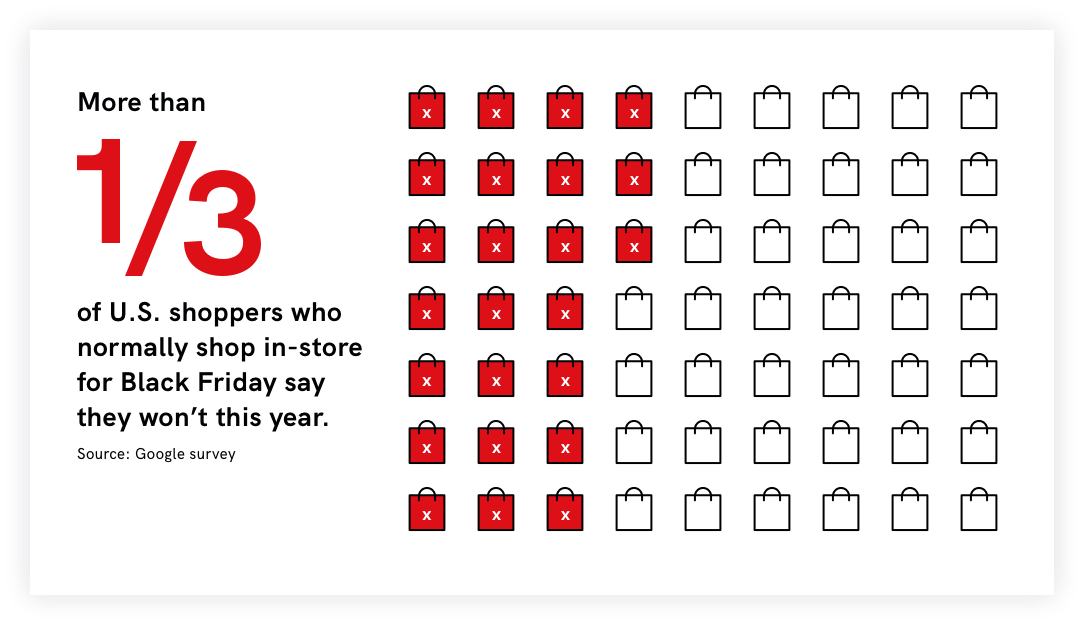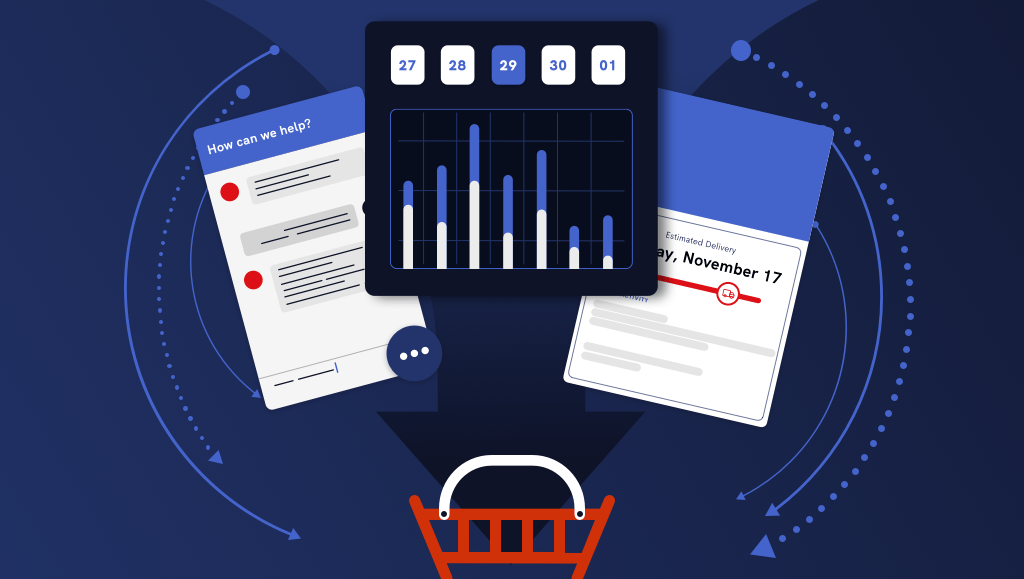Welcome to the wild west of modern holiday shopping: Cyber Weekend 2020. The global pandemic has rocked retail to the core and this year’s Black Friday Cyber Monday (BFCM) is not immune to its upending effects.
There are plenty of predictions on how this pandemic-era BFCM will shake out in terms of buyer behavior, and merchant behavior is drastically adapting as well. Many eCommerce merchants will do BFCM differently this year—some are participating for the first time ever and others are moving away from the extra-large deals of years past. Traditional brick-and-mortar brands have announced an online-only agenda, and we’re seeing the sales that are typically limited to a few days, now sprinkled out over months.
While some brands have had their reasons for sitting out BFCM in the past, that logic may or may not be relevant this year. On some level, every brand is in uncharted territory—even BFCM legends have never experienced a holiday season quite like this.
This year, BFCM eCommerce strategy is going to be so interconnected with the pandemic eCommerce strategy, it’s best for every brand - regardless of BFCM participation - to look at the remainder of Q4 holistically.
Unsurprisingly, technology is at the root of this conversation. Your tech stack can have an unbelievable impact on the success or failure of your eCommerce business. Anything less than a delightful shopping experience could cause web stores to lose money and customers, potentially forever.
This blog will cover the tech stack features and benefits you need in order to be successful, as well as specific technology products catering to this new eCommerce state. But first, let’s take a trip down memory lane and pull relevant lessons learned from the brands that have opted out of BFCM before.
Opting out of cyber weekend: The who and why
Okay, who are these Grinch-y brands (kidding) and why won’t they throw us 20% off every now and then? There are some pretty persuasive reasons why some brands choose not to discount during the holidays—or ever, in some cases.
-
It’s strategic, they don’t necessarily lose money and in fact, it might be more profitable in the long run. Brand image is often at the heart of this one. Take luxury brands for instance, such as Tiffany & Co. or Louis Vuitton, exclusivity is a cornerstone of their brand identity and they believe putting their product on sale will devalue that cachet. The ethical or environmental reasons some companies give as to why they don’t partake in BFCM also falls under the “brand identity” umbrella. One of the most buzzed-about examples from years past is REI. The outdoor retailer encourages customers to #optoutside instead of shop, a message that’s perfectly aligned with their outdoorsy identity. They get a lot of free publicity and it’s a brilliant strategy for cultivating brand connectedness and loyalty, which is ultimately profitable for them. Even amid the 2020 craziness REI will be opting outside instead of opening for Black Friday.

-
Many D2C brands feel their product is already discounted and the “sale” is baked into their D2C model. Away luggage was the textbook example of this mentality, stating their approach to manufacturing enables a “dramatically lower price every day of the year.” Other brands like this include Warby Parker and Allbirds, though don’t hold them to it in this unprecedented eCom landscape. That mentality was common pre-pandemic, but it’s becoming outdated for some. Away started discounting for the first time ever in this new era, as D2C brands across industries are forced to hrefadapt to the new online shopping habits of 2020.
-
Inventory shortages, not selling enough, and post-purchase customer service challenges. A lot can go wrong if brands don’t have a tried-and-true supply chain that can withstand cyber madness. It can be too risky for smaller retailers or newer merchants who would prefer to ease into discounting rather than dive in headfirst with strict holiday deadlines.
-
Some brands are just better aligned with other holidays or times of year. For example, a baby brand will want to do a big push for Mother’s Day and health and fitness merchants are always looking to New Year’s to cater to the “new year, new me” crowd.
Takeaways for 2020? In some cases these traditional anti-BFCM strategies may still be relevant, on the other hand, they could be completely tone-deaf.
Why non-BFCM brands still need a holiday shopping plan
You might be doing BFCM differently this year, or maybe you’re not participating at all. Either way, you still need to plan for the effects on the eCommerce industry as a whole, that Cyber Weekend 2020 is already producing.
Let’s start with Amazon. Prime Day in October had a chain reaction that forced the hand of other retailers like Walmart, Best Buy and Target to hold sales too. D2C retailers who partner with Amazon or held competing deals were struck with the kind of traffic and sales-potential typically seen at the end of November.
This hints to a seismic shift in the merchandising calendar where brands may need to optimize their web stores more consistently throughout the year, and not only when preparing for BFCM. This means lightning-fast page load speeds, mobile-first strategies, the ability to handle spikes in site traffic and customer service tickets, and easy two-way communication between brands and consumers.
As consumers are changing their approach to shopping, so are retailers. Brick-and-mortar retailers infamous for Black Friday doorbusters are closing their doors altogether to discourage congregations in the wake of COVID-19. And where will all these former in-person shoppers go? Online.

According to a Google survey, “More than a third of U.S. shoppers who normally shop in-store for Black Friday say they won’t this year. And half of U.S. shoppers say the pandemic will affect how they’ll shop for the holidays this year.”
Deals or no deals, people are shopping online in new ways and will be for the foreseeable future. Every eCommerce merchant needs to plan for it.
Tech benefits eCommerce merchants need in 2020 and beyond
Some D2C brands are doing a 180 on strategies of the past, and retailers are throwing the traditional sales cycle out of whack, resulting in new web store traffic patterns.
Technology is the only way brands can respond to consumer expectations effectively. These are the benefits you need to get from your tech investments:
-
Mobile Optimization: The majority of eCommerce traffic is mobile, and yet it’s easier to make a sale from someone on a desktop. The average eCommerce conversion rate for desktop is 3.9% compared to 1.82% on mobile. That’s a huge discrepancy between mobile traffic and conversion rates that points to a poor user experience on mobile devices. “Mobile-first” needs to be in the DNA of every tool in your tech stack.
-
Traffic Fluctuation Performance: Gone are the days of steady traffic year round with a big spike during Cyber Weekend. Now, traffic spikes are less predictable and certainly more widespread throughout the year. Your website needs to perform beautifully each and every time someone hits your homepage or you could face financial repercussions.
-
Emphasis on Speed: Like mobile optimization, site speed is crucial to any eCommerce merchant’s success. It’s statistically proven that 57% of online consumers will abandon your website if they have to wait more than three seconds for it to load, and 80% of those visitors will never return. Be mindful of third-party applications that could slow your site down, or incorporate tools that actively prioritize site speed.
-
Customer Service Driven: With frequent traffic and more online sales, customer service can be the deciding factor between a one-time customer and a lifetime customer. Look for tools that enable organization and easy, open two-way communication with customers.
-
Supply Chain Transparency: Shipping providers are always in the news around the holidays, and they’ve certainly been front and center during this pandemic. It’s on the merchant to plan for those disruptions, as well as communicate any delays or issues with their customers. Look for technology that can help you turn a potential bad experience around and perhaps even give you the opportunity to cross-sell or upsell.
Your pandemic-era holiday shopping toolkit
There’s really no time to lose in optimizing for the 2020 eCommerce landscape and that might mean introducing new technologies to your tech stack. Here are some specific recommendations that can help you with the necessary benefits discussed above.

-
Nacelle: We have to toot our own horn just a little, because some of the 2020 technology “musts” are simply at the core of what we provide to eCommerce merchants. The ability to handle traffic spikes, curate an excellent mobile experience, and enjoy sub-second page load speeds are the outcomes of using our headless commerce platform. We help our clients leverage those outcomes for better conversion rates and eCommerce KPIs such as average order value and return on ad spend. Plus, we’re a best-of-breed solution, meaning you can keep your favorite eCommerce tools that are already working well for you without any migrations or overhauls. And as your business grows, we can easily scale with you and make the process less disruptive to your customers.
-
Gorgias: Gorgias is an eCommerce helpdesk for merchants in the D2C space that supports their customer service efforts. It will help you centralize all your support tickets in one place with easy access to customer data as you solve their problems. It also allows you to automate repetitive tasks so you can optimize your time and spend more of it focused on your core business.
-
Malomo: Malomo is your go-to tool for order tracking and customer communication during shipping. On average, customers check tracking over four times per order. Malomo helps you make those interactions pleasant and even gives you a marketing avenue to earn more sales and brand loyalty. Shipping could be a make-it-or-break-it point in your customer’s buying journey, especially with the pressure of holiday shipping deadlines.
For more Cyber Weekend insights straight from eCommerce experts, your next read is eCommerce Experts Talk Online Sales for a Pandemic-era BFCM.